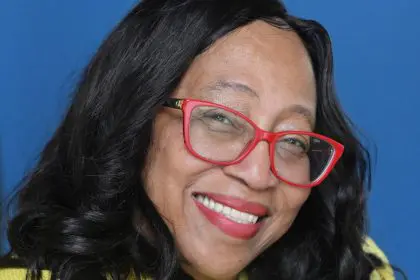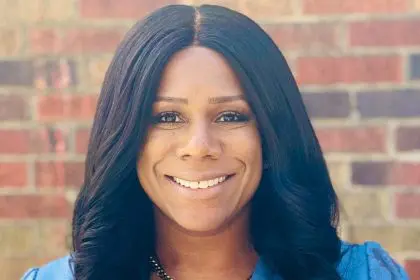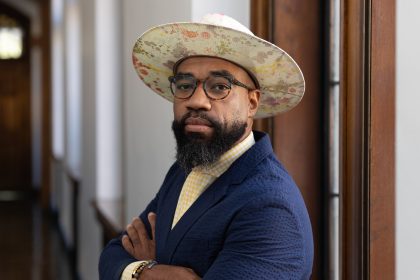Following a career on Wall Street, David Alade co-founded Century Partners in Detroit to develop high quality, accessible housing options within the city’s neighborhoods. Since 2015, Century Partners has led the rehabilitation of over 150 units of housing and currently owns around 250 rental units in Metro Detroit. Century Partners has won multiple awards since its inception including the ICIC’s Top 100 Fastest growing company in 2020 and 2021.
In 2020, Alade was appointed by Governor Gretchen Whitmer to the GHIB International Authority, a bicameral board which oversees the development of a $4.4-billion bridge connecting Detroit and Canada. He is the President of Detroit’s Real Association of Developers and is committed to advocating for and delivering resources to Detroit’s black development community.
In a conversation with Munson Steed, the publisher and CEO of rolling out, Alade discusses the importance of being a community partner and building spaces that create pathways for Detroit’s legacy residents while inviting new homeowners. Here is their conversation:
For those who are thinking about being CEOs, why is it important to [consider] being a developer?
In my former career, I was an investment banker. I worked on Wall Street for about eight years. In that job, we were tasked with raising billions of dollars to help primarily Fortune 500 companies do things like raise capital, make investments, and have more efficient treasury management. That was great, but one thing I struggled with in that job was seeing exactly how the money we raised impacted certain communities, the actual plant, or the employees. A lot of the time, you’re just moving zeros and ones from one digital account to another. One amazing thing about development is that you’re able to see how the work you’re doing every day physically impacts a neighborhood and a community, and how people interact and engage with one another in physical spaces. All of these things drive how we literally go about our lives on a day-to-day basis. That’s impacted by development. These are the physical assets, whether it’s buildings, single-family houses, or parks. Being thoughtful about landscaping, facilitating civic engagement, making neighborhoods feel safe and inclusive, or making them feel homogenous and not everybody is welcome there—these are all decisions developers make on a day-to-day basis. Having an opportunity to shape how folks of color engage with one another in a city—that opportunity was too important for me to pass on. I’m really happy I made [the] decision to co-found Century Partners in 2015.
Once you start a company, that’s just the beginning. It’s not the finish. At that point, you have to begin to collaborate. Why is it important for philanthropic organizations like Rocket Community Fund and Gilbert Family Foundation to engage with developers [regarding] shared vision and shared collaboration opportunities?
Part of the reason I moved [to Detroit was because of] its rich history. Even before the auto industry, Detroit’s location made it like the Silicon Valley of the Midwest. It has a constant history of innovation—whether it’s cultural, like Motown and techno, or business, like the auto industry. Detroit was a trading post, an international trade hub. This is where the American dream came true for so many people. Detroit had the highest per capita household Black wealth for decades, [partly] because of the auto industry. Many significant civil rights movements were supported and propelled by the people in Detroit. Detroit was a massive beacon of modernity and set an example for so much of the world. Just a decade ago, it was in bankruptcy. [It was] the largest municipal bankruptcy in U.S. history.
When you look at corporations and stakeholders investing in Detroit now, they have a responsibility to honor that legacy, the hard work, and the sacrifice of the people who made this place special. It’s not just dollars and cents; you have to be cognizant of the community. As we rebuild our city—I’ve been here a decade, so I can call it “our” city—we must keep that history in the forefront. Only then can we set a development cadence that’s different from other cities’ redevelopment processes. We want to develop without the negative effects of gentrification, which requires a comprehensive approach from community leaders, [corporations], philanthropy, and developers.
Rocket Community Fund and Gilbert Family Foundation play a huge role in facilitating those interactions, ensuring that Detroit’s comeback is inclusive and lifts up legacy residents while creating spaces for new folks to participate in the comeback.
Why did you name your company Century Partners? Why is legacy and time encapsulated in the naming of your venture?
I and my business partner, Andrew Colom, founded Century Partners. We met through Alpha Phi Alpha Fraternity, Inc. He played a significant role in leading my process of becoming a member of the Brotherhood. That fraternity has been around for over 100 years, founded in 1906. For Andrew and me, creating something Black-owned and enduring is core to our DNA. In real estate development, we’re not dealing in temporary investments. The decisions we make have ramifications for the next hundred years and certainly over the next decade. We want to be rooted here, in Detroit, for the long term. We want to be partners with the community and build something that will last for a century, paying homage to the Black leaders who led Detroit excellently.
Describe what you would consider one of your most successful developments over the last ten years.
We’ve done a lot of interesting things. I think we have to be one of the most dynamic real estate companies in the nation. We started by restoring old historic single-family and small multifamily housing on Atkinson Street, a historical street in Detroit. We aimed to give these beautiful historic structures, over 100 years old, another 100 years of life. We’ve done over 120 rehabs of structures like that across Detroit, activating vacant structures, filling them with life, and doing it with respect for the neighbors and the community. I’m really proud of that. We created a strategy that facilitated investment. Before we moved into some neighborhoods, much of the investment was done by slumlords. We led investments to deliver higher quality, affordable housing in Detroit’s neighborhoods. We facilitated investment primarily through friends and family funds. One of the things I’m most proud of is creating ways for native residents to invest alongside us in the fund and in their community. As the neighborhood improves and we continue to invest, these residents benefit from the appreciation of their homes and get a piece of every asset we own in the neighborhood. They receive rental cash flow, refinancing proceeds, and disposition fees, building wealth within their community as it appreciates. That’s one of the things I’m most proud of.
How can people invest in Century Partners? How can they become a part of your vision? How important is it that we support young Black developers like you who have a vision for [us] that we don’t see often?
One of the most important things for us is wanting more Century Partners. I lead an effort in Detroit as the president of the Real Estate Association of Developers, an advocacy group for developers of color. We provide resources, technical assistance, networking opportunities, and a space for developers to shape the policies affecting our neighborhoods. We want to be shapers of the policy, not just recipients. We’ve grown our membership from 40 people to almost 170 members in the last few years. To reach out to Century Partners, you can visit our website at www.centurypartners.com or email us at [email protected]. We have several interesting developments starting in the fourth quarter of this year through the first half of next year. Development is tough work; it’s one of the few jobs where you have to pay to work, hoping to get paid back if everything goes well. It’s important to have collaboration, real data, and resources. We need to get real information and resources out to our community so they embark on their wealth-building journey with eyes wide open [and are] aware of the risks and pitfalls. I try to be a hub and resource center in Detroit. Other young developers looking to get involved in the industry can reach out to me anytime. It’s hard work, but we’re looking to make these long-term, lasting, century-long investments to build generational wealth.
Collaboration is key. How important is it, especially for young developers, to understand what investors are looking for? You mentioned data, but in real estate, it’s more than just the cost of the building. There are studies that happen. Can you give us an idea of what investors want to know before deploying their capital?
Investors want to understand your character. Anytime you’re raising external capital, your character is paramount. People must trust you’ll do what you say with their money. When things don’t go as expected, they must trust you’ll be upfront in your communication. Character is crucial for building sustaining long-term partnerships. In real estate, it’s location, location, location. But another good adage is partnership, partnership, partnership. These are built over time by consistently doing what you say you’ll do and being upfront in communication, especially when the market doesn’t cooperate. Investors want to know when they’ll get their money back, the expected investment horizon, and how you plan to facilitate the capital return. Is it a long-term goal, a short-term play, or intermediate? Clearly telegraphing your strategy and ensuring it’s resilient with contingency plans is vital. Investors also want to see good teams—experienced builders, lenders, contractors, property managers. Development is about the team. You’re dependent on others to do the work—accountants, lawyers, tenants. Ensuring [you have] good partners and a good team is crucial. Communicating that story is important when talking with any potential investor.
How do you stay sharp in such a competitive and ever-changing landscape?
Staying connected to the community is important. In Detroit, we have a growing and established Black real estate development community. Having peers, folks who have done more development than I have, who are older, wiser, faster, and can give counsel, is critical. We have networks of trusted people to share trials, tribulations, and successes with. In Detroit, we’ve created a space where, even though we’re competing, we’re also helping each other. Having an attitude of abundance, knowing that if you give to the community, it will come back to you—that virtuous cycle is critical. It helps me stay sane and avoid mistakes others have made, and I can pay it forward.
You’re invited to “Dream Doors Lunch & Learn.” Tap here to RSVP –

















